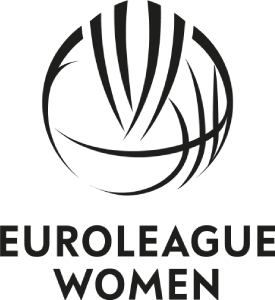The EuroLeague, known as the Turkish Airlines EuroLeague for sponsorship reasons, is a European men's professional basketball club competition. The league is widely recognised as the top-tier men's league in Europe. The league consists of 18 teams, of which 16 are given long-term licences and wild cards, making the league a semi-closed league. The league was first organized by FIBA in 1958, subsequently by ULEB in 2000 and then solely the Euroleague Basketball.

The FIBA Basketball World Cup is an international basketball competition between the senior men's national teams of the members of the International Basketball Federation (FIBA), the sport's global governing body. It takes place every four years and is considered the flagship event of FIBA.

The EuroLeague Women is the pre-eminent basketball league in Europe for women's basketball clubs.
The 1965–66 FIBA European Champions Cup was the ninth season of the European top-tier level professional basketball club competition FIBA European Champions Cup. It was won by Simmenthal Milano, for the first time in its history, the first of the club's three EuroLeague championships.
The FIBA Americas League, officially abbreviated as the LDA, was the premier intercontinental basketball club competition played annually by clubs of the entire Americas. Organized by FIBA Americas, the competition was replaced by the Basketball Champions League Americas (BCLA) in September 2019. The inaugural season started on 4 December 2007. The FIBA Americas League was a recreation of the now defunct Pan American Club Championship, that existed from 1993 to 2000.

The FIBA Intercontinental Cup, also commonly referred to as the FIBA World Cup for Champion Clubs, or the FIBA Club World Cup, is a professional basketball clubs competition that is endorsed by FIBA and the NBA. Historically, its purpose has been to gather the premier basketball clubs from each of the world's geographical zones, and to officially decide the best basketball club of the world, which is officially crowned as the world club champion. The World Cup for Clubs has been contended mainly by the champions of the continents and/or world geographical regions that are of the highest basketball levels.
The 1966–67 FIBA FIBA European Champions Cup was the tenth season of the European top-tier level professional basketball club competition FIBA European Champions Cup. The trophy was won by Real Madrid, for the third time, at their home venue Pavilion at the Sports City of Real Madrid, after they defeated Simmenthal Milano 91–83.
The EuroLeague Final Four is the final four format championship of the European-wide top-tier level EuroLeague professional club basketball competition. The Euroleague Basketball Company used the final four format for the first time in 2002, following the 2001 FIBA SuproLeague Final Four, which was the last final four held by FIBA Europe. In the original FIBA Europe competition, as seen below, the final four was used for the first time at the 1966 FIBA European Champions Cup Final Four. The final four format was used again the next year, with the 1967 FIBA European Champions Cup Final Four, but was then abandoned.
The 1990–91 FIBA European Champions Cup was the 34th season of the European top-tier level professional FIBA European Champions Cup. It was won by POP 84, after they beat FC Barcelona Banca Catalana 70–65. It was their second championship triumph over the Spanish team, and their third straight championship overall. A feat previously achieved only by Rīgas ASK, who won the first three editions of the trophy. The culminating 1991 FIBA European Champions Cup Final Four was held at Palais Omnisports de Paris-Bercy, Bercy, Paris, on 16–18 April 1991. Toni Kukoč was named Final Four MVP for the second straight year.

The FIBA Europe Cup (FEC) is an annual professional club basketball competition organised by FIBA for eligible European clubs. It is FIBA's second level competition. Clubs mainly qualify based on their performance in national leagues and cup competitions, although this is not the sole deciding factor. The winner is decided by a two-legged final.
The 1989–90 FIBA European Champions Cup was the 33rd season of the European top-tier level professional FIBA European Champions Cup. It was won by Jugoplastika, after they beat FC Barcelona Banca Catalana 72–67. It was the club's second title overall. The culminating 1990 EuroLeague Final Four was held at Pabellón Príncipe Felipe, Zaragoza, Spain, on 17–19 April 1990. Toni Kukoč was named Final Four MVP.
The 1988–89 FIBA European Champions Cup was the 32nd season of the European top-tier level professional FIBA European Champions Cup, which was won by Jugoplastika, after they beat Maccabi Elite Tel Aviv 75-69. The culminating 1989 EuroLeague Final Four was held at Olympiahalle, Munich, West Germany, on 4–6 April 1989. Dino Rađja was named Final Four MVP.
The 1987–88 FIBA European Champions Cup season was the 31st season of the FIBA European Champions Cup. It was won by Tracer Milano, after they beat Maccabi Elite Tel Aviv 90-84. It was the first season in the competition's modern era where the Final Four format was used to decide the champion. The 1988 FIBA European Champions Cup Final Four was held at Flanders Expo Pavilion in Ghent, Belgium, on 5–7 April 1988. Bob McAdoo was named Final Four MVP.
The 1980–81 FIBA European Champions Cup was the 24th season of the European top-tier level professional basketball club competition FIBA European Champions Cup. The Final was held at the Hall Rhénus, in Strasbourg, France, on March 26, 1981. In a tightly contested game, Maccabi Elite Tel Aviv defeated Sinudyne Bologna, by a result of 80–79.
The 1988 FIBA European Champions Cup Final Four was the concluding tournament of the 1987–88 FIBA European Champions Cup, and the first one with the FIBA European Champions Cup Final Four format since the 1967 edition of the European Cup.
The 1991 FIBA European Champions Cup Final Four was the 1990–91 season's FIBA European Champions Cup Final Four tournament, organized by FIBA Europe.

The Basketball Champions League (BCL), also commonly known as the FIBA Champions League, is an annual professional basketball competition for European clubs, organised by FIBA. It is the top-level competition organised by FIBA Europe, therefore the champion participates in the FIBA Intercontinental Cup.
The 1966 FIBA European Champions Cup Final Four was the concluding tournament of the 1965–66 FIBA European Champions Cup, and the first FIBA European Champions Cup Final Four tournament of all time.

The 2016–17 FIBA Europe Cup was the 2nd season of the FIBA Europe Cup, a European basketball club competition organised by FIBA Europe. The season began on 18 October 2016, with the regular season, and concluded on April 25, 2017, with the second leg of the Finals. Nanterre 92 was crowned FIBA Europe Cup champions after defeating Élan Chalon.
The 2022–23 FIBA Europe Cup was the 8th season of the FIBA Europe Cup, the second-level European professional club basketball competition organised by FIBA. The season began on 12 October 2022 and ended on 26 April 2023.






